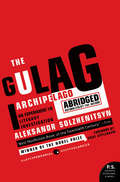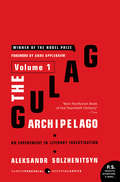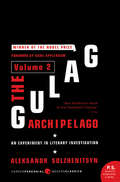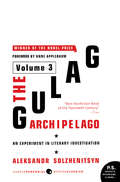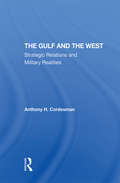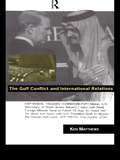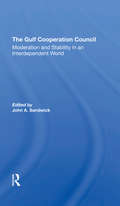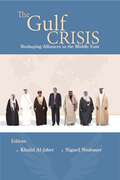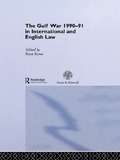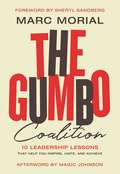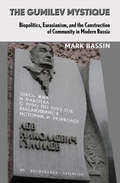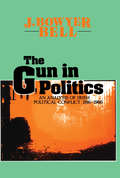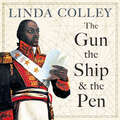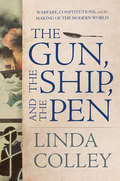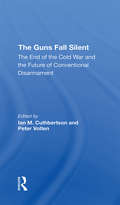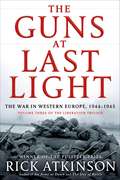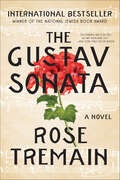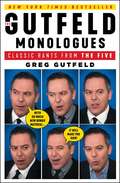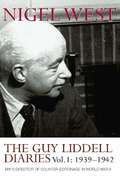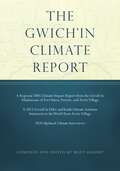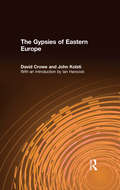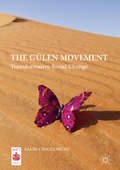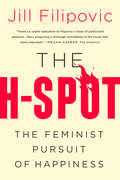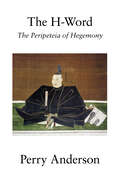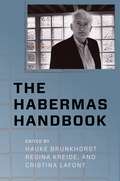- Table View
- List View
The Gulag Archipelago 1918-1956: An Experiment in Literary Investigation (P. S. Ser.)
by Aleksandr I. Solzhenitsyn“BEST NONFICTION BOOK OF THE 20TH CENTURY.” —Time“It is impossible to name a book that had a greater effect on the political and moral consciousness of the late twentieth century.” —David Remnick, The New YorkerThe Nobel Prize winner’s towering masterpiece of world literature, the searing record of four decades of terror and oppression, in one abridged volume (authorized by the author). Features a new foreword by Anne Applebaum.Drawing on his own experiences before, during and after his eleven years of incarceration and exile, on evidence provided by more than 200 fellow prisoners, and on Soviet archives, Solzhenitsyn reveals with torrential narrative and dramatic power the entire apparatus of Soviet repression, the state within the state that once ruled all-powerfully with its creation by Lenin in 1918. Through truly Shakespearean portraits of its victims-this man, that woman, that child-we encounter the secret police operations, the labor camps and prisons, the uprooting or extermination of whole populations, the “welcome” that awaited Russian soldiers who had been German prisoners of war. Yet we also witness astounding moral courage, the incorruptibility with which the occasional individual or a few scattered groups, all defenseless, endured brutality and degradation. And Solzhenitsyn’s genius has transmuted this grisly indictment into a literary miracle.“The greatest and most powerful single indictment of a political regime ever leveled in modern times.” —George F. Kennan“Solzhenitsyn’s masterpiece. . . . The Gulag Archipelago helped create the world we live in today.” —Anne Applebaum, Pulitzer Prize-winning author of Gulag: A History, from the foreword
The Gulag Archipelago Volume 1: An Experiment in Literary Investigation
by Aleksandr I. Solzhenitsyn“BEST NONFICTION BOOK OF THE 20TH CENTURY.” —TimeVolume 1 of the gripping epic masterpiece, Solzhenitsyn's chilling report of his arrest and interrogation, which exposed to the world the vast bureaucracy of secret police that haunted Soviet society. Features a new foreword by Anne Applebaum.“The greatest and most powerful single indictment of a political regime ever leveled in modern times.” —George F. Kennan“It is impossible to name a book that had a greater effect on the political and moral consciousness of the late twentieth century.” —David Remnick, The New Yorker“Solzhenitsyn’s masterpiece. . . . The Gulag Archipelago helped create the world we live in today.” —Anne Applebaum, Pulitzer Prize-winning author of Gulag: A History, from the foreword
The Gulag Archipelago Volume 2: An Experiment in Literary Investigation
by Aleksandr I. Solzhenitsyn“BEST NONFICTION BOOK OF THE 20TH CENTURY.” —TimeVolume 2 of the Nobel Prize-winner’s towering masterpiece: the story of Solzhenitsyn's entrance into the Soviet prison camps, where he would remain for nearly a decade. Features a new foreword by Anne Applebaum.“The greatest and most powerful single indictment of a political regime ever leveled in modern times.” —George F. Kennan“It is impossible to name a book that had a greater effect on the political and moral consciousness of the late twentieth century.” —David Remnick, The New Yorker“Solzhenitsyn’s masterpiece. . . . The Gulag Archipelago helped create the world we live in today.” —Anne Applebaum, Pulitzer Prize-winning author of Gulag: A History, from the foreword
The Gulag Archipelago Volume 3: An Experiment in Literary Investigation
by Aleksandr I. Solzhenitsyn“BEST NONFICTION BOOK OF THE 20TH CENTURY.” —Time <P><P>Volume 3 of the Nobel Prize winner’s towering masterpiece: Solzhenitsyn's moving account of resistance within the Soviet labor camps and his own release after eight years. Features a new foreword by Anne Applebaum. <P><P>“The greatest and most powerful single indictment of a political regime ever leveled in modern times.” —George F. Kennan <P><P>“It is impossible to name a book that had a greater effect on the political and moral consciousness of the late twentieth century.” —David Remnick, New Yorker <P><P>“Solzhenitsyn’s masterpiece. . . . The Gulag Archipelago helped create the world we live in today.” —Anne Applebaum, Pulitzer Prize-winning author of Gulag: A History, from the foreword
The Gulf And The West: Strategic Relations And Military Realities
by Anthony H CordesmanThis book examines the military capabilities of various potential threats, the capabilities of Saudi Arabia and other friendly Gulf states, and the capabilities of Western power projection forces.
The Gulf Conflict and International Relations
by Ken MatthewsThis book provides a comprehensive analysis and review of the major events and the leading actors of the Gulf War. Copies of key documents and essential factual information build up a picture of the realities of war in the Middle East but the material is set in a strong theoretical framework. This allows the author to see the conflict within the context of the international system and to relate it to the changes of the post-cold-war world. Matthews looks at the shifts in international order which dictated the nature of the international response to the war, but also at the new conditions created by the war itself. What scope is there for Arab socialism after the fall of European socialism? Has the conflict made Israel stronger or weaker? Can the UN be entrusted with the post of global peace-keeper?
The Gulf Cooperation Council: Moderation And Stability In An Interdependent World
by John A. SandwickThe Gulf Cooperation Council represents both a model of development and unity in the Arab world and a working example of interstate cooperation to other nations. In this volume, contributors describe the rationale for Gulf unity and cooperation and analyze the financial, economic, and legal institutions of the GCC member states (Saudi Arabia, Kuwait, the United Arab Emirates, Oman, Bahrain, and Qatar). They focus on the GCC's role in maintaining stability in the Arabian peninsula, an area that is clearly vital to U.S. interests. Contributors pinpoint the essential elements of GCC unity, including its efforts to obtain optimum economic self-sufficiency, to maximize market share and revenue from oil production, and to establish an integrated legal framework. The GCC's unique security needs, given the member states' vast combined area and thinly spread populations, are also discussed. An overview of the strategic interests and policies of both superpowers toward the region reveals a history of decline in their influence and prestige that is a result, it is argued, of misperceptions and misguided policies. Finally, documentation and bibliographic sections enhance the book's usefulness as a handbook on the GCC and the Arabian Gulf states.
The Gulf Crisis: Reshaping Alliances in The Middle East
by Khalid Al-Jaber & Sigurd NeubauerThe Gulf Crisis marks a clear dividing line in the GCC's history reflecting a change in the political, economic, security, social and media realities of the intra-GCC relationship. The question on everyone's mind: will this Crisis be the final nail in the coffin of the Gulf Cooperation Council after nearly four decades?
The Gulf War 1990-91 in International and English Law
by Peter RoweThere is no doubt that international law was of major importance during the Gulf conflict of 1990-91. Military and other actions were repeatedly justified through reference to international law, and disputes about interpretation were frequent. This book provides a definitive legal analysis of the conflict, with reference both to international and to English law. Some have been tempted to argue that international law is an ineffective means of controlling the activities of a state and its armed forces from the fact that there were no war crimes trials of the leaders of Iraq, or of any other state. International law does, however, provide a set of norms either (a) agreed to by individual states through the ratification of, or accession to, a treaty, or (b) which apply to all states by the operation of customary international law and other secondary sources. This book determines these norms in order to judge the manner in which individual states recognized the binding nature of them in the conduct of their operations. The contributors include lawyers from each of the three British armed services.
The Gumbo Coalition: 10 Leadership Lessons That Help You Inspire, Unite, and Achieve
by Marc MorialTo be a great leader, you must be able to unite people from all backgrounds with seemingly competing agendas to come together under a common cause. Marc Morial, former mayor of New Orleans and current president and CEO of the National Urban League, has been such a leader and shares the lessons he learned along a legendary journey of achievement.Morial knew his calling from a young age--he was meant to be a leader in the fight for meaningful change. Growing up in the segregated South and helping his father realize an incredible victory as the first African American mayor of New Orleans, Morial was shown that, with the right tools, significant change is possible. Less than two decades later, in his own mayoral race in New Orleans,?Morial?built what he christened the &“Gumbo Coalition,&” an incredible mixture of?all of?New Orleans&’s ingredients--African Americans,?Whites, Latinos, Asians, business leaders, grassroots community activists, business leaders, clergy, and many more. Each ingredient brought its own flavor, creating a dish that was able to reduce crime and rebuild New Orleans&’s reputation with such power that the city was able to successfully attract an NBA franchise, multiple Super Bowls, and the Essence Festival, the largest African American event in the nation.Now, Morial fights on behalf of the National Urban League to create a community with a voice so strong that nothing can stand in the way of change. He is ready to teach others what he has learned along the way, by showing readers what it means to be a leader who can unite voices and create meaningful change.
The Gumilev Mystique: Biopolitics, Eurasianism, and the Construction of Community in Modern Russia
by Mark Bassin Ronald Grigor SunySince the collapse of the Soviet Union, the legacy of the historian, ethnographer, and geographer Lev Nikolaevich Gumilev (1912-1992) has attracted extraordinary interest in Russia and beyond. The son of two of modern Russia's greatest poets, Nikolai Gumilev and Anna Akhmatova, Gumilev spent thirteen years in Stalinist prison camps, and after his release in 1956 remained officially outcast and professionally shunned. Out of the tumult of perestroika, however, his writings began to attract attention and he himself became a well-known and popular figure.Despite his highly controversial (and often contradictory) views about the meaning of Russian history, the nature of ethnicity, and the dynamics of interethnic relations, Gumilev now enjoys a degree of admiration and adulation matched by few if any other public intellectual figures in the former Soviet Union. He is freely compared to Albert Einstein and Karl Marx, and his works today sell millions of copies and have been adopted as official textbooks in Russian high schools. Universities and mountain peaks alike are named in his honor, and a statue of him adorns a prominent thoroughfare in a major city. Leading politicians, President Vladimir Putin very much included, are unstinting in their deep appreciation for his legacy, and one of the most important foreign-policy projects of the Russian government today is clearly inspired by his particular vision of how the Eurasian peoples formed a historical community. In The Gumilev Mystique, Mark Bassin presents an analysis of this remarkable phenomenon. He investigates the complex structure of Gumilev's theories, revealing how they reflected and helped shape a variety of academic as well as political and social discourses in the USSR, and he traces how his authority has grown yet greater across the former Soviet Union. The themes he highlights while untangling Gumilev's complicated web of influence are critical to understanding the political, intellectual, and ethno-national dynamics of Russian society from the age of Stalin to the present day.
The Gun in Politics: Analysis of Irish Political Conflict, 1916-86
by J. Bowyer BellIrish history sounds a long litany of grievance and vengeance—lost battles, escaped earls, and institutionalized injustice. The gun, certainly in this century, has played a prominent part. In The Gun in Politics, J. Bowyer Bell presents the story of one Ireland—the Ireland of the Troubles—and about an approach to understanding political violence. In particular, he examines the Irish Republic Army, the longest-enduring unsuccessful revolutionary organization. He de-scribes the covert world of gunmen and the great game they play in the street.His is a lively, telling account of sophisticated weapons transfer, of the impact of civil war on society, and of appropriate democratic responses to terrorism. Bell's association with active Republicans, his endless tea seminars at the United Irishman, drinks at Hennessy's, and constant conversation throughout Ireland on political matters over a period of twenty years has provided the author with unique background for this guide to a fascinating, though brutal, undercurrent of Irish history.
The Gun, the Ship and the Pen: Warfare, Constitutions and the Making of the Modern World
by Linda Colley'If there were a Nobel Prize in History, Colley would be my nominee' Jill Lepore, New Yorker'One of the most exciting historians of her generation, but also one of the most interesting writers of non-fiction around' - William Dalrymple, Guardian'Colley takes you on intellectual journeys you wouldn't think to take on your own, and when you arrive you wonder that you never did it before' - David Aaronovitch, the Times'A global history of remarkable depth, imagination and insight' Tony Barber, Financial Times Summer BooksStarting not with the United States, but with the Corsican constitution of 1755, The Gun, the Ship, and the Pen moves through every continent, disrupting accepted narratives. Both monarchs and radicals play a role, from Catherine the Great of Russia, with her remarkable Nakaz, to Sierra Leone's James Africanus Horton, to Tunisia's Khayr-al-Din, a creator of the first modern Islamic constitution. Throughout, Colley demonstrates how constitutions evolved in tandem with warfare, and how they have functioned to advance empire as well as promote nations, and worked to exclude aswell as liberate.Whether reinterpreting Japan's momentous 1889 constitution, or exploring the significance of the first constitution to enfranchise all adult women on Pitcairn Island in the Pacific in 1838, this is one of the most original global histories in decades.
The Gun, the Ship, and the Pen: Warfare, Constitutions, And The Making Of The Modern World
by Linda ColleyVivid and magisterial, The Gun, the Ship, and the Pen reconfigures the rise of a modern world through the advent and spread of written constitutions. A work of extraordinary range and striking originality, The Gun, the Ship, and the Pen traces the global history of written constitutions from the 1750s to the twentieth century, modifying accepted narratives and uncovering the close connections between the making of constitutions and the making of war. In the process, Linda Colley both reappraises famous constitutions and recovers those that have been marginalized but were central to the rise of a modern world. She brings to the fore neglected sites, such as Corsica, with its pioneering constitution of 1755, and tiny Pitcairn Island in the Pacific, the first place on the globe permanently to enfranchise women. She highlights the role of unexpected players, such as Catherine the Great of Russia, who was experimenting with constitutional techniques with her enlightened Nakaz decades before the Founding Fathers framed the American constitution. Written constitutions are usually examined in relation to individual states, but Colley focuses on how they crossed boundaries, spreading into six continents by 1918 and aiding the rise of empires as well as nations. She also illumines their place not simply in law and politics but also in wider cultural histories, and their intimate connections with print, literary creativity, and the rise of the novel. Colley shows how—while advancing epic revolutions and enfranchising white males—constitutions frequently served over the long nineteenth century to marginalize indigenous people, exclude women and people of color, and expropriate land. Simultaneously, though, she investigates how these devices were adapted by peoples and activists outside the West seeking to resist European and American power. She describes how Tunisia generated the first modern Islamic constitution in 1861, quickly suppressed, but an influence still on the Arab Spring; how Africanus Horton of Sierra Leone—inspired by the American Civil War—devised plans for self-governing nations in West Africa; and how Japan’s Meiji constitution of 1889 came to compete with Western constitutionalism as a model for Indian, Chinese, and Ottoman nationalists and reformers. Vividly written and handsomely illustrated, The Gun, the Ship, and the Pen is an absorbing work that—with its pageant of formative wars, powerful leaders, visionary lawmakers and committed rebels—retells the story of constitutional government and the evolution of ideas of what it means to be modern.
The Guns Fall Silent: The End Of The Cold War And The Future Of Conventional Disarmament
by Ian Cuthbertson Peter M VoltenThis book discusses part of the military-stability problem, notably the part relating to East-West relationships, which is becoming synonymous with military stability between the Soviet Union and NATO.
The Guns at Last Light: The War in Western Europe, 1944-1945 (The Liberation Trilogy #3)
by Rick Atkinson<p>The magnificent conclusion to Rick Atkinson's acclaimed Liberation Trilogy about the Allied triumph in Europe during World War II. It is the twentieth century's unrivaled epic: at a staggering price, the United States and its allies liberated Europe and vanquished Hitler. <p>In the first two volumes of his bestselling Liberation Trilogy, Rick Atkinson recounted how the American-led coalition fought through North Africa and Italy to the threshold of victory. Now, in <i>The Guns at Last Light</i>, he tells the most dramatic story of all, the titanic battle for Western Europe. <p>D-Day marked the commencement of the final campaign of the European war, and Atkinson's riveting account of that bold gamble sets the pace for the masterly narrative that follows. The brutal fight in Normandy, the liberation of Paris, the disaster that was Operation Market Garden, the horrific Battle of the Bulge, and finally the thrust to the heart of the Third Reich-all these historic events and more come alive with a wealth of new material and a mesmerizing cast of characters. <p>Atkinson tells the tale from the perspective of participants at every level, from presidents and generals to war-weary lieutenants and terrified teenage riflemen. When Germany at last surrenders, we understand anew both the devastating cost of this global conflagration and the enormous effort required to win the Allied victory. <p>With the stirring final volume of this monumental trilogy, Atkinson's accomplishment is manifest. He has produced the definitive chronicle of the war that unshackled a continent and preserved freedom in the West.</p>
The Gustav Sonata: A Novel
by Rose TremainWinner of the 2016 National Jewish Book Award for Fiction A poignant tale about the enduring friendship between two men under the shadow of the Second World War.Gustav Perle grows up in a small town in Switzerland, where the horrors of the Second World War seem only a distant echo. An only child, he lives alone with Emilie, the mother he adores but who treats him with bitter severity. He begins an intense friendship with a Jewish boy his age, talented and mercurial Anton Zweibel, a budding concert pianist. The novel follows Gustav’s family, tracing the roots of his mother’s anti-Semitism and its impact on her son and his beloved friend. Moving backward to the war years and the painful repercussions of an act of conscience, and forward through the lives and careers of the two men, one who becomes a hotel owner, the other a concert pianist, The Gustav Sonata explores the passionate love of childhood friendship as it is lost, transformed, and regained over a lifetime. It is a powerful and deeply moving addition to the beloved oeuvre of one of our greatest contemporary novelists.
The Gutfeld Monologues: Classic Rants from the Five
by Greg GutfeldThe New York Times bestselling collection from FOX News star Greg Gutfeld features his best and pithiest monologues on the current state of the world, covering everything from pop culture to politics, annotated for the modern day with all new content.&“Wherever I go, I am hit repeatedly by the same question: where can I read your monologues? It should be easy to find these little nuggets of knowledge.&” Well, now it is. In the past few years, Fox News host Greg Gutfeld has covered everything from crazed academics, to unhinged celebrities, to the wildest election in recent history on his shows The Five and The Greg Gutfeld Show. In The Gutfeld Monologues, he brings together his best and favorite monologues in this funny, unconventional collection for new and longtime fans alike. Scored through with marginal edits, scratch-outs, 20/20 hindsight, and up-to-the-minute commentary on what he got wrong, this book isn&’t your typical anthology collection. With his signature humor, wit, and insight, Greg explains it all in this memorable collection about some of our country&’s most crucial—and not so crucial—modern moments.
The Guy Liddell Diaries, Volume I: MI5's Director of Counter-Espionage in World War II
by Nigel WestThis is the first volume of Nigel West's acclaimed presentation of these fascinating diaries from the heart of Britain's Second World War intelligence operations. 'No intelligence buff can be without this volume and anyone interested in British twentieth century history needs it too.' M.R.D. Foot, The Spectator 'Regarded by historians as the most important military intelligence documents from the whole of the Second World War.' Irish Independent '[A] unique insight into the espionage secrets of the Second World War. Its historical importance is enhanced by the editing of Nigel West who, apart from decoding several obscure references to the secret war, persuaded the Security Service to break their rule of maintaining an agent's anonymity.' BBC History Magazine WALLFLOWERS is the codename given to one of the Security Service's most treasured possessions, the daily journal dictated from August 1939 to June 1945 by MI5's Director of Counter Espionage, Guy Liddell, to his secretary, Margo Huggins. The document was considered so highly classified that it was retained in the safe of successive Directors General, and special permission was required to read it.No other member of the Security Service is known to have maintained a diary and the twelve volumes of this journal represent a unique record of the events and personalities of the period, a veritable tour d'horizon of the entire subject. As Director, B Division, Liddell supervised all the major pre-war and wartime espionage investigations, maintained a watch on suspected pro-Nazis and laid the foundations of the famous 'double cross system' of enemy double agents. He was unquestionably one of the most reclusive and remarkable men of his generation, and a legend within his own organization.
The Gwich’in Climate Report
by Matt GilbertA regional climate impact and adaptation report from the Gwich'in Athabascans of Interior Alaska, The Gwich’in Climate Report is a compilation of transcribed interviews between Matt Gilbert and northern Alaska Gwich’in Athabascan community members, elders, hunters, and trappers. The book explores Gwich’in insight and wisdom about ecology, climate, and the drastic effects of climate change on their landscapes and culture. These interview subjects are at a “ground zero” of climate change, and their voices are largely absent from popular research on and discussion of the topic. Their traditional knowledge of Arctic flora and fauna, forestation, landforms, meteorology, airstream behavior, and river hydrology makes a significant contribution to the documentation of climate change. In addition, Gilbert bridges the Gwich’in worldview and that of Western science by including factual substantiation and citations that corroborate key observations in the Gwich’in transcripts. A text that matters for its cultural and historical significance—as well as its potential impact on the way science and policy are conducted in rural Alaska and on public lands—TheGwich’in Climate Report will be of interest to residents of and stakeholders in the communities it represents as well as researchers concerned with on-the-ground conditions of ecosystems and Indigenous peoples most directly affected by climate change.
The Gypsies of Eastern Europe
by David Crowe John Kolsti Ian HancockIn recent news coverage of the dramatic political events in Eastern Europe, Gypsies have been a favourite sidebar topic. Some of the stories have been truly horrifying, others are written condescendingly and to amuse; but what has become clear is how little we really know about this people. In a concerted effort to uncover the modern history of the Rom in Eastern Europe, the authors examine the Gypsy experience in Albania, Czechoslovakia, Hungary, Romania and Yugoslavia, with special attention to the Nazi Holocaust as well as to the record of the forced settlement and education programmes instituted by communist regimes.
The Gülen Movement: Transformative Social Change (Middle East Today)
by Salih CıngıllıoğluThis book presents findings from research into one of the world's most influential Islamic movements, the Gülen Movement, from the perspective of social transformation through adult education. At the core of research questions lies how the movement enrolls volunteers from all walks of life and transforms them to adopt its aims at the expense of their individual ideals. The book reveals the socio-psychological mechanisms that make such transformation possible by looking at how followers integrate weekly lectures and discussions on the theory and practice of Islam into their personal and social lives. The Gülen Movement offers a moderate interpretation of Islam and stresses the vitality of establishing communication with the members of all faiths. This book provides a window into how and why religion may roll into extremism by presenting findings from an opposite perspective: the participants in the research all define themselves as truly pious but do not even imply an act of violence in tens of hours of interviews. In short, the book weaves the strands of "Islamic," "movement," and "adult education" into a unified whole and limns the snapshot of a social movement, offering a comprehensive discussion of the role of adult education within the movement, as well as its transformative potential and its wider social and political implications.
The H-Spot: The Feminist Pursuit of Happiness
by Jill FilipovicWhat do women want? The same thing men were promised in the Declaration of Independence: happiness, or at least the freedom to pursue it.For women, though, pursuing happiness is a complicated endeavor, and if you head out into America and talk to women one-on-one, as Jill Filipovic has done, you see that happiness is indelibly shaped by the constraints of gender, the expectations of feminine sacrifice, and the myriad ways that womanhood itself differs along lines of race, class, location, and identity.In The H-Spot, Filipovic argues that the main obstacle standing in-between women and happiness is a rigged system. In this world of unfinished feminism, men have long been able to "have it all" because of free female labor, while the bar of achievement for women has only gotten higher. Never before have women at every economic level had to work so much (whether it's to be an accomplished white-collar employee or just make ends meet). Never before have the standards of feminine perfection been so high. And never before have the requirements for being a "good mother" been so extreme. If our laws and policies made women's happiness and fulfillment a goal in and of itself, Filipovic contends, many of our country's most contentious political issues-from reproductive rights to equal pay to welfare spending-would be swiftly resolved.Filipovic argues that it is more important than ever to prioritize women's happiness-and that doing so will make men's lives better, too. Here, she provides an outline for a feminist movement we all need and a blueprint for how policy, laws, and society can deliver on the promise of the pursuit of happiness for all.
The H-Word: The Peripeteia of Hegemony
by Perry AndersonA fascinating history of the political theory of hegemonyFew terms are so widely used in the literature of international relations and political science, with so little agreement about their exact meaning, as hegemony. In the first full historical study of its fortunes as a concept, Perry Anderson traces its emergence in Ancient Greece and its rediscovery during the upheavals of 1848–1849 in Germany. He then follows its checkered career in revolutionary Russia, fascist Italy, Cold War America, Gaullist France, Thatcher’s Britain, post-colonial India, feudal Japan, Maoist China, eventually arriving at the world of Merkel and May, Bush and Obama. The result is a surprising and fascinating expedition into global intellectual history, ending with reflections on the contemporary political landscape.
The Habermas Handbook (New Directions in Critical Theory #40)
by Cristina Lafont Regina Kreide Hauke BrunkhorstJürgen Habermas is one of the most influential philosophers of our time. His diagnoses of contemporary society and concepts such as the public sphere, communicative rationality, and cosmopolitanism have influenced virtually all academic disciplines, spurred political debates, and shaped intellectual life in Germany and beyond for more than fifty years. In The Habermas Handbook, leading Habermas scholars elucidate his thought, providing essential insight into his key concepts, the breadth of his work, and his influence across politics, law, the social sciences, and public life.This volume offers a comprehensive overview and an in-depth analysis of Habermas’s work in its entirety. After examining his intellectual biography, it goes on to illuminate the social and intellectual context of Habermasian thought, such as the Frankfurt School, speech-act theory, and contending theories of democracy. The Handbook provides an extensive account of Habermas’s texts, ranging from his dissertation on Schelling to his most recent writing about Europe. It illustrates the development of his thought and its frequently controversial reception while elaborating the central ideas of his work. The book also provides a glossary of key terms and concepts, making the complexity of Habermas’s thought accessible to a broad readership.
